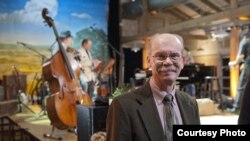NASHVILLE, Tennessee – One of the most authentic descriptions of pioneer life on the American frontier can be found in a series of children’s stories. Laura Ingalls Wilder's eight "Little House" books have sold over 60 million copies worldwide in more than 40 languages. Although works of fiction, the stories are semi-autobiographical, drawing heavily on Wilder’s own childhood in Kansas and South Dakota in the mid 1800s. While pioneer life has disappeared, the music Wilder grew up with is alive and well.
The Little House on the Prairie television series is perhaps the best-known adaption of the Laura Ingalls Wilder stories. The show aired for eight seasons beginning in 1974 and has since been translated into 18 languages.
“Her work, her books, her stories are quintessentially American," explains actor Dean Butler, who played Laura Ingall’s husband, Almonzo Wilder on the series. Butler later produced a documentary about the author’s life and books.
“They’re about discovery and struggle and triumph over adversity. They’re about family and about making your way in the world,” Butler says.
This year, he produced a television special entitled “Pa’s Fiddle: The Music of America.” The show is part documentary, part recorded-live performance.
"Pa’s Fiddle" is based on the 127 songs mentioned in the Little House stories, mostly fiddle tunes played by the family patriarch Charles “Pa” Ingalls like “Arkansas Traveler” or “Devil’s Dream.”
Butler hadn’t thought about the books’ musical legacy until he attended a lecture on the subject by musicologist Dale Cockrell.
“As he was weaving the narrative of these songs, and the way that they were embedded into the books, I just loved the way he told the stories,” Butler explains.
That polished presentation was the result of a decade of scholarship. Cockrell, a professor at Vanderbilt University, had already published a 425-page reference book on the Little House songs, seven books of sheet music, and nearly 50 musical recordings on 3 CDs.
Cockrell stumbled on the songs when he began reading the "Little House" books to his eight-year-old son. He realized that nowhere had he seen a fuller portrait of popular music from a crucial era.
“Just about any form of popular music that would have been heard and enjoyed by audiences from the 1860s to the 1880s - the genre, the category at least - is included in the books,” he says.
Cockrell says it’s a legacy he fears Americans are losing touch with.
“Maybe being a historian I’m prejudiced," he admits, "but I think to understand who we are as musical beings now, we need to understand who we were as musical beings then.”
One thing that songs like “Oft in the Stilly Night" and Wilder’s stories help 21st century audiences understand, Cockrell says, is that 19th century pioneer life was a dangerous, unrelenting struggle.
“These aren’t superheroes. The dog dies. The children die. The houses burn down. The crops get destroyed. They’re often picking up and moving on because of defeat,” notes Cockrell.
Defeat perhaps, but never despair. As Wilder herself wrote, “There's no great loss without some small gain.”
The Little House on the Prairie television series is perhaps the best-known adaption of the Laura Ingalls Wilder stories. The show aired for eight seasons beginning in 1974 and has since been translated into 18 languages.
“Her work, her books, her stories are quintessentially American," explains actor Dean Butler, who played Laura Ingall’s husband, Almonzo Wilder on the series. Butler later produced a documentary about the author’s life and books.
“They’re about discovery and struggle and triumph over adversity. They’re about family and about making your way in the world,” Butler says.
This year, he produced a television special entitled “Pa’s Fiddle: The Music of America.” The show is part documentary, part recorded-live performance.
"Pa’s Fiddle" is based on the 127 songs mentioned in the Little House stories, mostly fiddle tunes played by the family patriarch Charles “Pa” Ingalls like “Arkansas Traveler” or “Devil’s Dream.”
Butler hadn’t thought about the books’ musical legacy until he attended a lecture on the subject by musicologist Dale Cockrell.
“As he was weaving the narrative of these songs, and the way that they were embedded into the books, I just loved the way he told the stories,” Butler explains.
That polished presentation was the result of a decade of scholarship. Cockrell, a professor at Vanderbilt University, had already published a 425-page reference book on the Little House songs, seven books of sheet music, and nearly 50 musical recordings on 3 CDs.
Cockrell stumbled on the songs when he began reading the "Little House" books to his eight-year-old son. He realized that nowhere had he seen a fuller portrait of popular music from a crucial era.
“Just about any form of popular music that would have been heard and enjoyed by audiences from the 1860s to the 1880s - the genre, the category at least - is included in the books,” he says.
Cockrell says it’s a legacy he fears Americans are losing touch with.
“Maybe being a historian I’m prejudiced," he admits, "but I think to understand who we are as musical beings now, we need to understand who we were as musical beings then.”
One thing that songs like “Oft in the Stilly Night" and Wilder’s stories help 21st century audiences understand, Cockrell says, is that 19th century pioneer life was a dangerous, unrelenting struggle.
“These aren’t superheroes. The dog dies. The children die. The houses burn down. The crops get destroyed. They’re often picking up and moving on because of defeat,” notes Cockrell.
Defeat perhaps, but never despair. As Wilder herself wrote, “There's no great loss without some small gain.”





